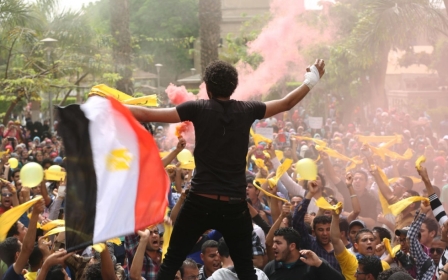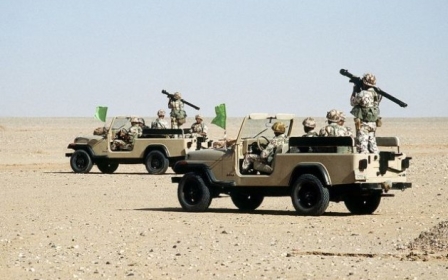Documents show US continues to arm Egyptian government

Newly obtained documents reveal that the US government has continued to provide substantial weapons support to the military-backed Egyptian government, despite the State Department's assertion that it would withhold important weapons shipments "pending credible progress toward an inclusive, democratically elected civilian government."
Though the military assistance freeze was announced last October, the US has continued to send the Egyptian military millions of dollars worth of parts for tanks, helicopters, fighter jets and guided missiles. More specifically, the US sent $44 million worth of guided missiles in February; $24.9 million worth of parts for armored fighting vehicles, including crucial parts like cannons and gun mounts for M1 Abram tanks from October to February; $5 million worth of parts for Apache helicopters and F-16 fighter jet parts. Significantly, M1 Abramtanks, F-16fighter jets and Apaches were all explicitly said to be suspended in the State Department's arms freeze statement.
In November, the US delivered one new Fast Missile Craft (FMC) and plans to deliver three more. FMCs are high-tech naval vessels designed to launch the very Harpoon missiles the State Department sought to suspend deliveries of to Egypt. Furthermore, the US resumed shipment of Apache helicopters in April, backtracking on a decision made last autumn to withhold such shipments.
Department of Defence contracts have likewise continued during the supposed weapons suspension, with the Egyptian military receiving the following: $7 million in Hawk surface-to-air missiles manufactured by Aerojet Rocketdyne Inc.; $6.9 million for fighter jets manufactured by Lockheed Martin; and $400,000 in Harpoon missile systems manufactured by Boeing.
This comes at a controversial time for the Egyptian government, which is under sharp criticism from human rights organizations to the White House for its human rights violations. The goverment has been criticised for overthrowing the elected government of Mohammed Morsi, designating the Muslim Brotherhood political party a "terrorist organization," despite the fact that they received over 51 percent of the vote during Morsi's election, imprisoning legitimate journalists on spurious charges and issuing mass death sentences without due process.
Members of both parties in Congress have voiced concern over the Egyptian military's human rights violations. For example, former US presidential candidate Sen. John McCain (R-Arizona) said, "if [Egypt] want[s] to be part of the community of nations and have our cooperation and assistance, then [it] cannot engage in practices such as the arbitrary imprisonment of members of the media." Likewise, Sen. Patrick Leahy (D-Vermont) said that "if the [Egyptian] military continues its repressive tactics . . . aid will be cut off."
President Obama called for the "return [of] full authority back to a democratically elected civilian government as soon as possible," though the White House remained silent when then-Field Marshall and now President-elect Abdel Fattah al-Sisi, who oversaw the Muslim Brotherhood's removal from power, announced his candidacy for the presidency. In contrast to the White House's reticence, former Egyptian military general, Ahmed Shafik (who ran against Morsi during the 2012 election) denounced Sisi's candidacy. Shafik said that the election would be a "farce" because "they will fix all the ballot boxes [for Sisi]."
The interim government has detained over a thousand people for violating a law forbidding most protest, and has engaged in a crackdown on the media, which has left a number of Al Jazeera employees jailed since 29 December. The Al Jazeera journalists include British, Dutch and Australian nationals on trial, according to the Egyptian Prosecutor's Office, for being part of a "terrorist organization…and harming national unity and social peace." Amnesty International's chief, Sahil Shetty, called the regime's imprisonment of journalists "part of an overall attempt to repress freedom of expression."
The UN High Commissioner for Human Rights spokesman criticized an Egyptian court's decision in March to sentence over 528 people to death, characterising it as a "breach of international law." (The court later commuted 491 of the accused to life imprisonment.) In April, an Egyptian court sentenced to death an additional 683 Muslim Brotherhood supporters, including the party's leader. Human Rights Watch's executive director for the Middle East, Sarah Leah Whitson, described the two court rulings as "possibly the largest . . . death sentences in recent world history." Mohamed Elmessiry, an Amnesty International researcher who observed the hearings, stated: "In each trial, the defence were not able to present their case, the witnesses were not heard and many of the accused were not brought to the courtroom."
The White House said it was "deeply troubled" by the ruling, remarking that it "defies even the most basic standards of international justice." It further called on the Egyptian government to "ensure that every citizen is afforded due process, including the right to a fair trial in which evidence is clearly presented, and access to an attorney." Sen. Lindsey Graham, the ranking Republican on the Senate subcommittee responsible for foreign aid remarked, "I'm not going to invest in a country that's in a state of anarchy."
Shana Marshall, associate director of the Institute for Middle East Studies at George Washington University, told Truthout via email: "If the Obama administration wanted to penalise Egyptian government officials, they would place a comprehensive ban on arms exports to Cairo."
Despite the range of opposition to Egypt's new regime, US Secretary of State John Kerry has refused to call the Egyptian military's seizure of power a coup, instead describing their actions as "restoring democracy." A law that passed in January exempts Egypt from longstanding legislation requiring an end to US military assistance after a coup.
Despite the State Department's professed concerns over "the climate for freedom of expression and freedom of assembly and association in Egypt," the Obama administration released $650 million in military aid to Egypt for "counterterrorism and border security" in April. An additional $577 million could be made available to Egypt if John Kerry certifies to Congress that Egypt is following the "roadmap" to democracy
Copyright Truthout.org. Reprinted with permission of the authors.
Middle East Eye propose une couverture et une analyse indépendantes et incomparables du Moyen-Orient, de l’Afrique du Nord et d’autres régions du monde. Pour en savoir plus sur la reprise de ce contenu et les frais qui s’appliquent, veuillez remplir ce formulaire [en anglais]. Pour en savoir plus sur MEE, cliquez ici [en anglais].




